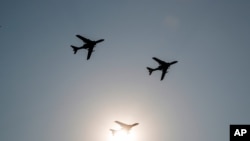Taiwan’s agreement this month to buy $8 billion worth of advanced F-16 fighter jets from the United States will prompt threats from China against the island and in turn spark more anti-China action by Washington, but eventually help keep Beijing at bay, experts say.
U.S. President Donald Trump approved the sale a year ago of at least 66 late-model jets and this month Taiwan signed an agreement to buy them from by 2026 from American defense contractor Lockheed Martin Corp. It will be Taiwan’s first such deal since the U.S. government approved a sale of 150 F-16s in 1992.
Downward-spiraling relations
The current sale marks the latest development in downward-spiraling Sino-U.S. military, political and trade relations. As part of that trend, the U.S. side has buoyed China’s old political rival Taiwan since 2017 through arms sales and naval activity aimed at safeguarding the island, which is just 160 kilometers off the Chinese coast.
“Given everything that has happened between Beijing and Washington, I think the Chinese feel that this is just another measure that [the] Trump administration has held up of their anti-China trend,” said Yun Sun, East Asia Program senior associate at the Stimson Center, a research organization in Washington.
Beijing sees Taiwan as part of its territory and insists that the two sides eventually unify despite widespread opposition among Taiwanese people. The dispute goes back to the Chinese civil war of the 1940s, when the Nationalists lost to the Communists and re-based their government in Taiwan. China, armed with the world's third-strongest military, has not ruled out use of force if needed to take over Taiwan.
Separately, the U.S. and China have blocked each other’s internet services, shuttered consulates and, since 2018, been embroiled in a trade dispute. The arms sale is part of that struggle, experts say.
“Whenever the U.S. and Taiwan do something together, China is obligated to respond and that response naturally is going to escalate the tension, because that’s the action-reaction cycle,” Sun said.
Military maneuvers
China has stepped up military maneuvers near Taiwan since June. On August 10, the Chinese air force briefly sent planes across a median line dividing Taiwan’s air defense zone from China’s. It had flown over the line at least eight other times in June.
China’s People’s Liberation Army has held amphibious landing exercises off the south coast of China too “at a time when the U.S. has been frequently conducting provocative military activities near the island of Taiwan,” Beijing’s state-controlled Global Times news website reported August 9. It anticipated more exercises over the coming weeks.
“The U.S. should be warned and should not make dangerous moves to avoid misjudgments that neither side would like to see,” the Global Times said, citing analysts.
U.S. Navy vessels pass all but routinely through the ocean strait separating China from Taiwan, and two U.S. aircraft carrier groups sailed into the adjacent South China Sea last month.
Taiwan’s purchase of the F-16s shows that Washington is determined to keep pressuring China, said Sean King, vice president of the Park Strategies political consultancy in New York. The U.S. military has offered support in recent months for Vietnam and the Philippines as well, as both Southeast Asian countries vie with China over maritime sovereignty.
'So much frustration'
“There’s just so much frustration in Washington with Beijing right now that nobody in the Trump administration is ready to stand in the way of whatever's good for Taiwan,” King said.
China has been used to a closer economic relationship with the United States and settling political issues through diplomacy. Its “recent behavior” may mark a “new era in Chinese foreign policy, one that reflects the country’s growing strength and ambitions,” Council on Foreign Relations’ president Richard Haass writes in an August 13 commentary.
However, China can do only so much in reaction to the fighter jet sale and other specific military moves by Washington, analysts say.
The U.S. activity reminds China that Washington could protect Taiwan if attacked, Sun said.
Communist officials would act “bluntly” against Taiwan only if they had a stronger consensus within their ruling party and freedom from domestic economic issues, including trade issues with the United States, said Alexander Huang, strategic studies professor at Tamkang University in Taiwan.
“I believe a rational decision-making body or a relatively rational [Chinese President] Xi Jinping would not like to take the risk unless there is an overwhelming challenge from Taiwan,” Huang said.
Chinese officials have vented less vociferously this time compared to their reactions to previous U.S. arms sales to Taiwan, King said.
“That could be because Beijing's taking so many hits from Washington at the moment that it's not quite sure which perceived outrage to prioritize,” he said.




